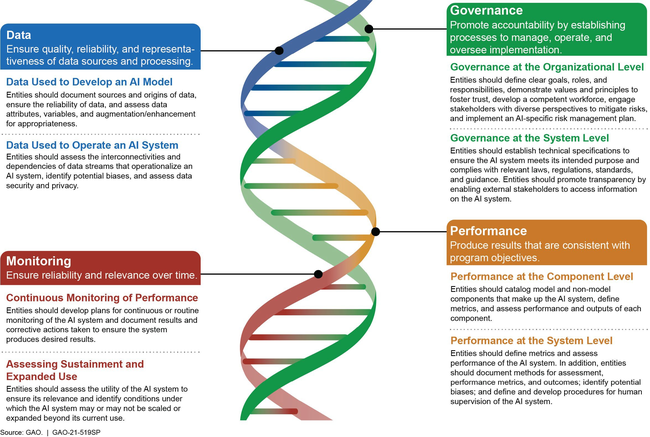Artificial Intelligence: An Accountability Framework for Federal Agencies and Other Entities
Fast Facts
As a nation, we have yet to grasp the full benefits or unwanted effects of artificial intelligence. AI is widely used, but how do we know it's working appropriately?
This report identifies key accountability practices—centered around the principles of governance, data, performance, and monitoring—to help federal agencies and others use AI responsibly. For example, the governance principle calls for users to set clear goals and engage with diverse stakeholders.
To develop these practices, we held a forum on AI oversight with experts from government, industry, and nonprofits. We also interviewed federal inspector general officials and AI experts.

Highlights
What GAO Found
To help managers ensure accountability and responsible use of artificial intelligence (AI) in government programs and processes, GAO developed an AI accountability framework. This framework is organized around four complementary principles, which address governance, data, performance, and monitoring. For each principle, the framework describes key practices for federal agencies and other entities that are considering, selecting, and implementing AI systems. Each practice includes a set of questions for entities, auditors, and third-party assessors to consider, as well as procedures for auditors and third- party assessors.
Why GAO Developed This Framework
AI is a transformative technology with applications in medicine, agriculture, manufacturing, transportation, defense, and many other areas. It also holds substantial promise for improving government operations. Federal guidance has focused on ensuring AI is responsible, equitable, traceable, reliable, and governable. Third-party assessments and audits are important to achieving these goals. However, AI systems pose unique challenges to such oversight because their inputs and operations are not always visible.
GAO's objective was to identify key practices to help ensure accountability and responsible AI use by federal agencies and other entities involved in the design, development, deployment, and continuous monitoring of AI systems. To develop this framework, GAO convened a Comptroller General Forum with AI experts from across the federal government, industry, and nonprofit sectors. It also conducted an extensive literature review and obtained independent validation of key practices from program officials and subject matter experts. In addition, GAO interviewed AI subject matter experts representing industry, state audit associations, nonprofit entities, and other organizations, as well as officials from federal agencies and Offices of Inspector General.
Artificial Intelligence (AI) Accountability Framework

For more information, contact Taka Ariga at (202) 512-6888 or ArigaT@gao.gov.
